On the first floor of a two-story house along Mexico City’s plush Avenida Amsterdam sits Merkava: Hummus and Jerusalem Kitchen. The sign over the blue-and-white exterior is scrawled in a swoopy font emblematic of Hebrew letters; inside, the restaurant’s back wall is made of golden Jerusalem stone.
For most residents in Condesa, the chic Mexico City neighborhood where Merkava is located, the restaurant’s look — and its menu of Jewish classics like chicken fried in its own fat, or schmaltz, and chopped liver with egg — doesn’t signify much; a few may recognize the trends of modern Jewish deli fare and upscale Israeli cooking that are sweeping the globe. But for those who know, the distinctly Jewish bent of Merkava harks back to a different time in Condesa’s history.
Over the last two decades, Condesa has become the neighborhood for tourists, young entrepreneurs, and nightlife seekers in Mexico City. But it wasn’t always this way. Until the mid-1980s, when a massive earthquake rattled the entire neighborhood, Condesa was a modest working-class hub and the heart of Mexico’s Ashkenazi Jewish community. “In the 1950s and ’60s, almost all Ashkenazi Jewish life in Mexico revolved around Condesa,” says historian Jiene Torenberg, who teaches at Mexico City’s Iberoamericana and Anahuac universities. Torenberg estimates that at its peak, 5,000 Jews lived in the less than three-square-mile neighborhood of Condesa, which at one point boasted three synagogues as well as the headquarters for many other Jewish institutions. “There were always mothers speaking in Yiddish in Parque Mexico,” Torenberg remembers.
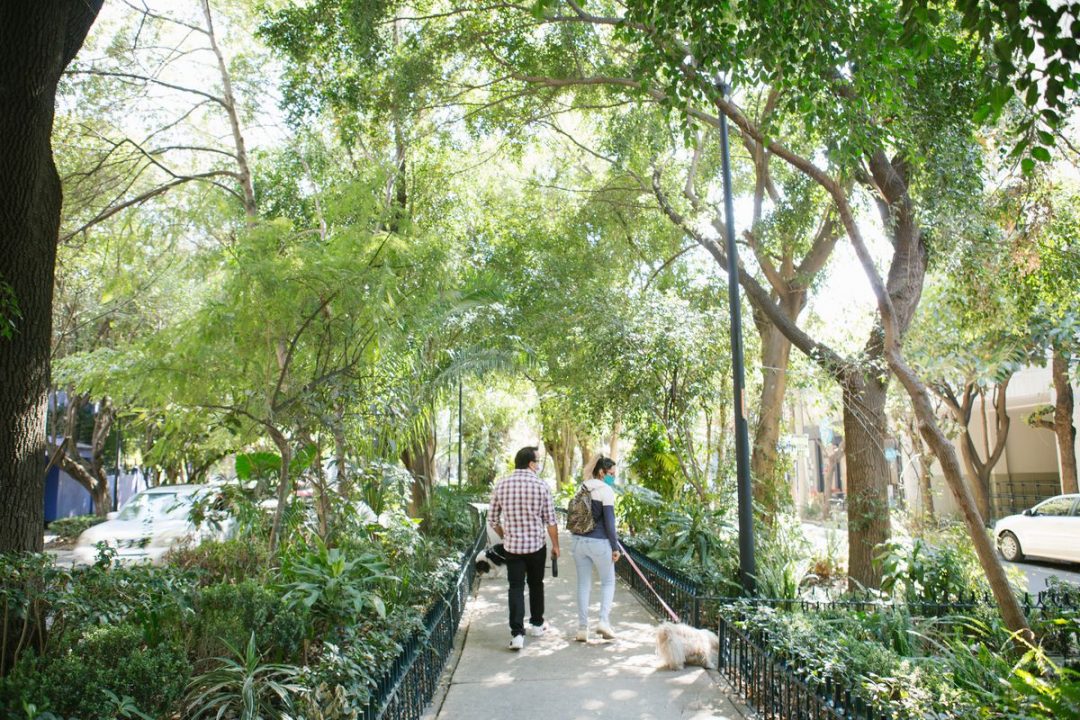
But by the late ’60s and early ’70s, the Jewish community started trading apartments in the city for houses in the western suburbs, and removed itself from public purview. “Condesa became your grandparents’ neighborhood,” Torenberg stated, and as families migrated, so too did almost all traces of Jewish life from Condesa. For the few original families that remained, the ’85 earthquake was the final shove. Many of the damaged buildings were bought and transformed by high-end developers, initiating a period of rapid gentrification and a paradigmatic shift of Condesa’s socioeconomic makeup. As the neighborhood changed and nightclubs and valet parking replaced the ground-floor bodegas, many of the communities who helped build the area — including the Jews — left, either because they wanted to or because they were priced out.
Today, thanks to businesses like Merkava and a handful of other Jewish-leaning restaurants that have opened in its wake, hints of the area’s past are returning. “A Jewish renaissance is taking place,” says Fabian Navas, standing outside his new Condesa sandwich shop. In February, just weeks before the COVID-19 pandemic shut down most Mexico City businesses, Navas, 28, along with his friends, Ilan Steiner, 27, and Moisés Levy, 27, opened Bodegga Deli on the first floor of an apartment building once occupied almost exclusively by Jewish residents. The menu at Bodegga includes playful deli classics like a “Loxenstein” lox and bagel sandwich, a Reuben sandwich called the R.K.R, and a vegan shawarma made with cauliflower.
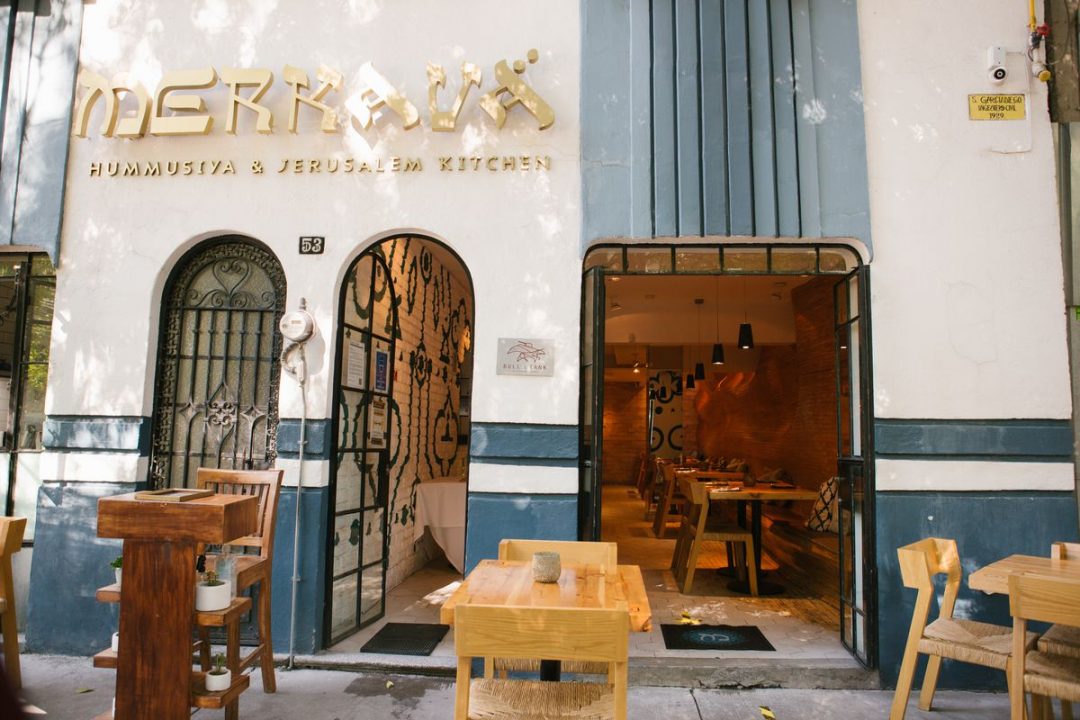
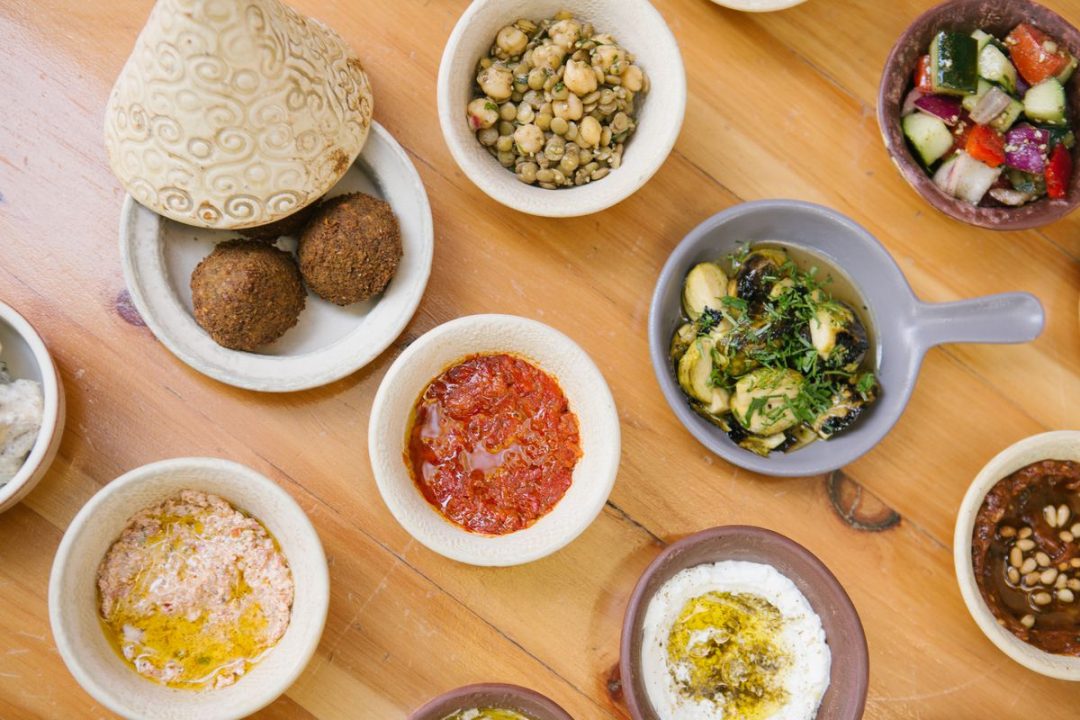
“Jewish food is incredibly hard to define,” says Daniel Ovadía, 37, the chef-owner of Merkava and the preeminent face of Jewish food in Mexico today. “It’s a set of ingredients that were always being mixed and adapted to their local context, within kosher limits.” Merkava’s menu reflects this amalgamation: Sephardic touches like honey, roses, and dates garnish many of the menu’s salatim, or small share plates, while the entrees lean more Ashkenazi — chicken fried in schmaltz, chopped chicken liver with egg, and puffy bourekas.
Since Merkava’s opening five years ago, there are now three different Jewish-inspired restaurants along Condesa’s famed Avenida Amsterdam, including Bodegga. But until now, “no one knew about Jewish food in Mexico besides the Jews,” says Navas. Ovadía agrees, and is working hard to change that. “You can draw a direct line between Basque-style codfish stew, prepared by Jews in Morocco, who took it to Spain, and pescado a la Veracruzana. Veracruz is where Jews first arrived in Mexico, and the [two] dishes are exactly the same.” But without doubt, Ovadía says the cabrito al pastor has been the most important food item adapted by Mexican Jews. Many of the moros who fled to Mexico from Spain in the 1500s continued practicing Judaism in secret, and eventually swapped goat meat for pork. Today in the northern states of Coahuila and Nuevo Leon, you’ll find locals eating cabrito al pastor eaten alongside guacamole and flour tortillas, with little understanding of its original roots.
At Merkava, Ovadía is working hard to re-connect those dots, and translating Jewish food for the Mexican public with a selection of corned beef and lox sandwiches with garnishes like Oaxaca cheese, avocado, and pico de gallo. But the most popular item at Merkava by far is its Reuben sandwich: “There is at least one Reuben at every single table,” Ovadía says proudly.
Classic deli sandwiches also anchor the menu at Schmaltzy Bros Delicatessen, a family-run pastrami delivery operation based in Condesa, led by Jonathan Weintraub, 25, along with his parents, Sergio, 60, and Jackie, 50, and his brother Gabriel, 15. When the pandemic swept the city in April, Weintraub, whose family has owned and operated a kosher catering business for more than 40 years, began making homemade pastrami to scratch the itch during quarantine.
“We’ve always been a fan of delis like Katz’s,” says Weintraub, referring to the Manhattan landmark. He and his father and brother knew they wanted something traditional, but also updated. “We wanted a product that’s really clean, really well packaged, something tailored,” says Weintraub. In addition to pastrami, they’ve slowly begun introducing more Jewish foods to the menu; just last month, they launched matzo ball soup.
Around the same time the Schmaltzy brothers began shuttling pastrami across Mexico City, Ovadía opened his second Condesa restaurant, Nosh: Tel Aviv Kitchen. It’s tucked into a gem of an Art Deco building with ornate molding around the pentagonal-shaped doorway. The building’s original name, Edificio Tehuacan, remains carved into its front-facing facade. Nosh — as its Yiddish name might suggest — draws more heavily on Ovadía’s Ashkenazi background than its predecessor, with hand-holding descriptions of dishes on the menu, like varenikes, identified as a “traditional Ukrainian-Jewish ravioli,” or bialys, defined as a “traditional Jewish bread from Bialystok.”
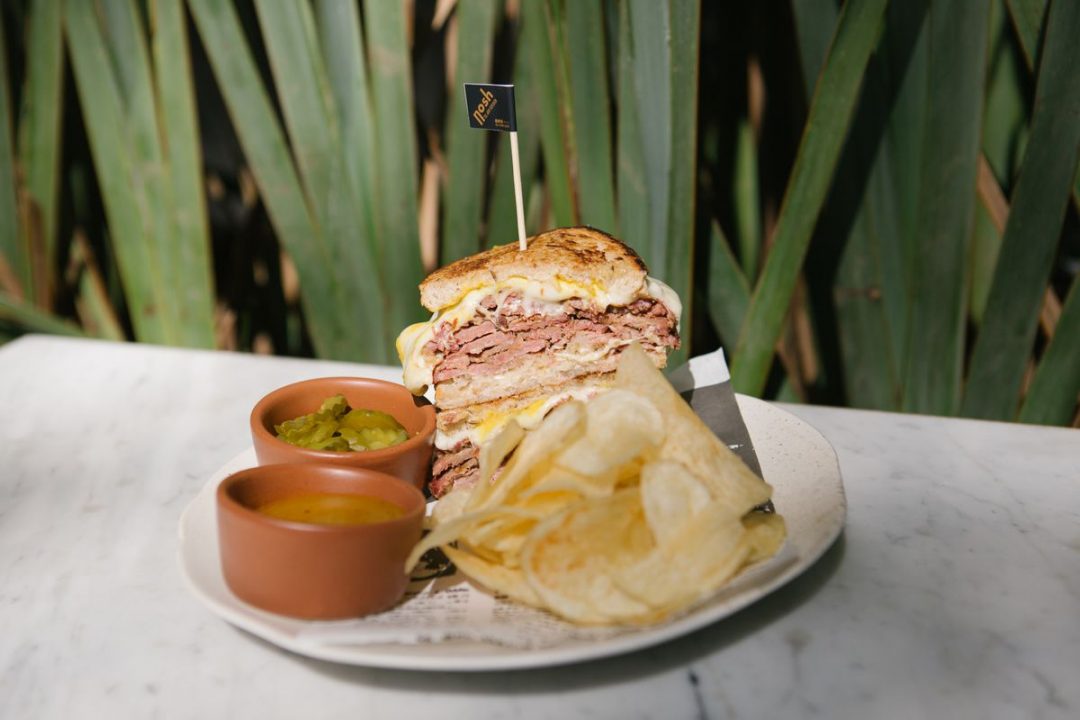
“People ask, why not [open in] Bosques?” says Ovadía, referring to one of the city’s more densely Jewish western suburbs. “[I] always felt I was going to compete with everyone’s grandmas if I opened a restaurant there. … Condesa is where the Jewish community began to thrive in Mexico City. Condesa is where I was born. It’s where my grandparents lived until they died. It’s where Jewish schools took off, where synagogues exploded.”
Still, along with all the other hurdles restaurants face these days, opening a Jewish restaurant in today’s non-Jewish Condesa means an extra burden of educating a public who may not be familiar with the food. But Bodegga’s Navas believes that might be part of the appeal. “These are young people who want to try new things,” he says. “People who live in Condesa are some of the city’s most open minded. We’ve been really well received here, and, especially during COVID-19, I think we would have closed anywhere else.”
Weintraub doesn’t mind the challenge either. During one delivery to the city’s south side, a customer asked Weintraub for directions on how to eat the herring while standing in the doorway. “I just laughed,” says Weintraub. “‘Don’t worry, you’re going to love it.’”
Nili Blanck is a Mexican-American writer whose work has appeared in GARAGE, Remezcla, and T Magazine. She lives in Mexico City with her dog, Claudio.

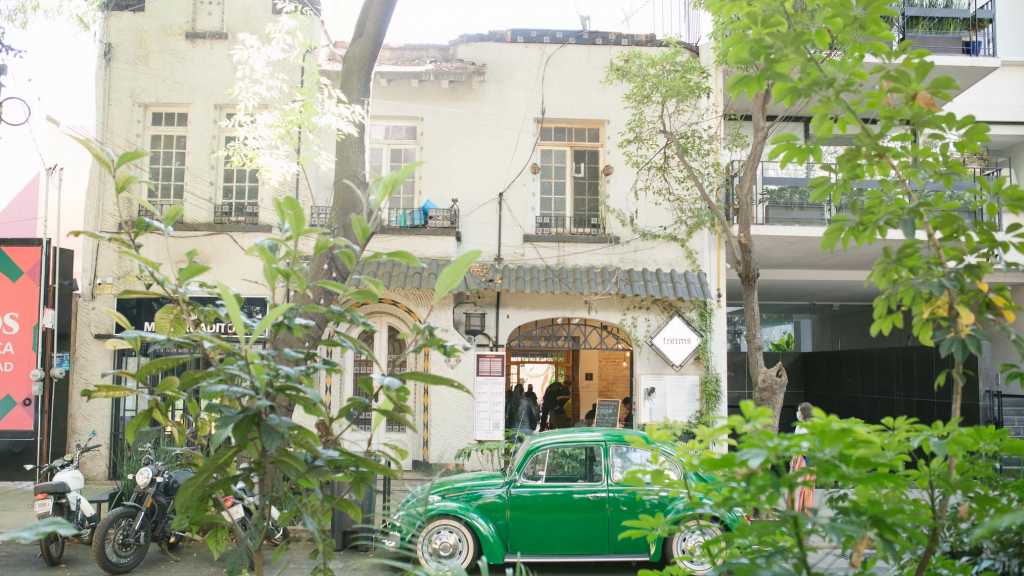
Buen artículo, habla de nostalgia así como del futuro de las tradiciones culinarias judías!!!
Hola Toys Ya llevamos más de un año formando grupos para los hijos (Shomer )
Y un grupo de Mayores y estupendas personas y ya se está organizando para usar las sinagogas para no perder los permisos uno ya está trabajando muy bien
Vuelven los Judíos a la Roma !!! Fantástico
Saludos Benito